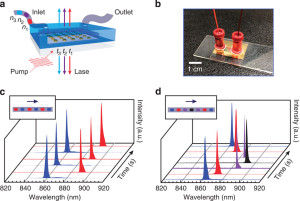
The laser also has the potential to be used in optical data storage and lithography.
Image: Nature Communications
Former ECS member Teri Odom has assisted in the development of the first ever liquid nanoscale laser. This development could lead to some very practical applications, as well as guiding researchers one step closer to developing a “lab on a chip” for medical diagnostics.
The laser is relatively simple to create, cheap to produce, and has the ability to operate at room temperature. Because the device works in real time, users can quickly and simply produce different colors.
This from Science World Report:
The laser’s cavity itself is made up of an array of reflective gold nanoparticles where the light is concentrated around each nanoparticle and then amplified. In contrast to conventional laser cavities, no mirrors are required for the light to bounce back and forth. As the laser color is tuned the nanoparticle cavity stays fixed and does not change.
“Our study allows us to think about new laser designs and what could be possible if they could actually be made,” said Odom in a news release. “My lab likes to go after new materials, new structures and new ways of putting them together to achieve things not yet imagined. We believe this work represents a conceptual and practical engineering advance for on-demand, reversible control of light from nanoscopic sources.”
Get the full study in the journal Nature Communications.
Join ECS today to gain invaluable connections and learn about the latest scientific trends in battery, fuel cells, materials science, and more!

